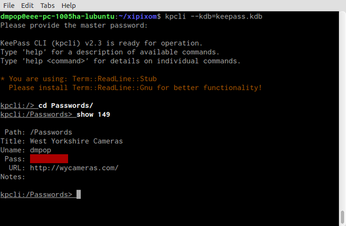kpcli: Work with KeePass Databases from the Command Line

Productivity Sauce
KeePassX is an indispensable graphical utility for managing passwords, but there are situations, when a command-line tool might be more practical. Enter kpcli, a Perl-based CLI tool that lets you work with KeepPass 1.x and 2.x databases. On Debian and Ubuntu, kpcli is available in the official software repositories, so it can be easily installed by running the apt-get install kpcli command as root. openSUSE users can install the utility directly from software.opensuse.org/package/kpcli.

To open an existing KeePass database, use the kpcli --kdb=foo.kdb command. Issue then the help command to view a list of all available commands along with their brief descriptions. Although the list of supported commands is rather long, you need only a few of them to get started with kpcli. Better still, kpcli imitates the shell syntax, which makes it easier to get to grips with the utility. The ls command lets you view a list of all directories and entries in the current location, while the cd command is used to switch to a specific directory. To view an entry, use the show command. Finally the xp, xu, and xw commands are used to copy the password, user name, and URL from a specified entry to the clipboard. For example, the xp Passwords/Amazon command copies the password from the Amazon entry in the Passwords directory into the clipboard.
comments powered by DisqusSubscribe to our Linux Newsletters
Find Linux and Open Source Jobs
Subscribe to our ADMIN Newsletters
Support Our Work
Linux Magazine content is made possible with support from readers like you. Please consider contributing when you’ve found an article to be beneficial.

News
-
Chaos Comes to KDE in KaOS
KaOS devs are making a major change to the distribution, and it all comes down to one system.
-
New Linux Botnet Discovered
The SSHStalker botnet uses IRC C2 to control systems via legacy Linux kernel exploits.
-
The Next Linux Kernel Turns 7.0
Linus Torvalds has announced that after Linux kernel 6.19, we'll finally reach the 7.0 iteration stage.
-
Linux From Scratch Drops SysVinit Support
LFS will no longer support SysVinit.
-
LibreOffice 26.2 Now Available
With new features, improvements, and bug fixes, LibreOffice 26.2 delivers a modern, polished office suite without compromise.
-
Linux Kernel Project Releases Project Continuity Document
What happens to Linux when there's no Linus? It's a question many of us have asked over the years, and it seems it's also on the minds of the Linux kernel project.
-
Mecha Systems Introduces Linux Handheld
Mecha Systems has revealed its Mecha Comet, a new handheld computer powered by – you guessed it – Linux.
-
MX Linux 25.1 Features Dual Init System ISO
The latest release of MX Linux caters to lovers of two different init systems and even offers instructions on how to transition.
-
Photoshop on Linux?
A developer has patched Wine so that it'll run specific versions of Photoshop that depend on Adobe Creative Cloud.
-
Linux Mint 22.3 Now Available with New Tools
Linux Mint 22.3 has been released with a pair of new tools for system admins and some pretty cool new features.
